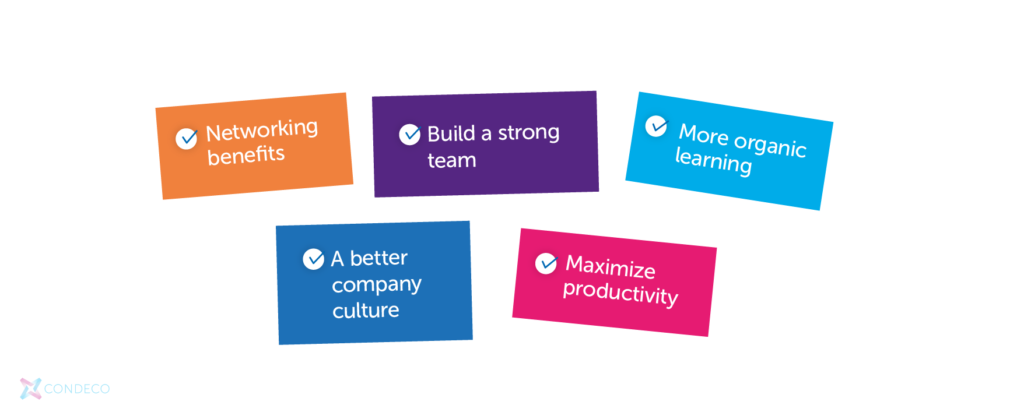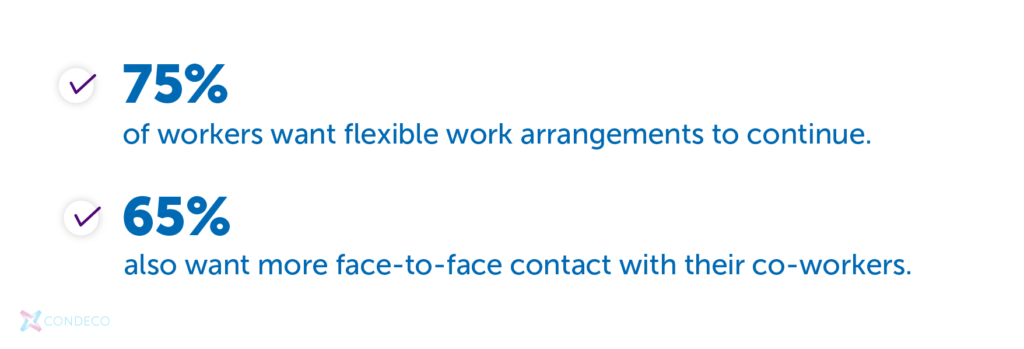
Not only has flexible work changed the way we do our jobs day-to-day, but it’s also changed the way we communicate. Meetings on Zoom or Microsoft Teams and online chats on solutions like Google Hangouts replace those ad hoc, informal conversations we would have in the office without thinking. But could this be a bad thing?
What are informal work conversations?
Casual communication between employees. It’s not necessarily about work or tasks/projects. Unofficial in nature and is based in informal, social relationships formed outside of the standard hierarchy in a workplace. It involves the casual exchange of information/ideas that can foster and strengthen employee relationships.
Why do these conversations matter?
You might not realize it, but all those little conversations actually help employees become better at their jobs, integrate into a business better, and even further their careers. In this blog, we’ll look at five reasons why informal work conversations can’t afford to be neglected even as the world moves towards a much more flexible future.

Networking benefits
Think back to the early days of your career when you were trying to get opportunities. Chances are that you’ve benefited from spontaneous conversations with managers or other contacts, generating opportunities to climb the ladder or explore new roles and projects. Now, think about how hard it must be to open those doors virtually. Using email or collaboration tools to try and build a relationship with a key decision-maker is almost the work equivalent of cold calling.
Build a strong team

Remember all those Friday night drink socials you had over Microsoft Teams during lockdown? Well, they were the best we could do then, but in hindsight, they weren’t exactly great, were they? Creating personal relationships and connections between employees is possible virtually, but the effectiveness of it only goes so far. Having a free-flowing conversation over video calls is much harder, and it becomes almost impossible to read body language and nuance. This is one in which there is no substitute for an in-person.
More organic learning

Increasingly, employees realize that there must be a balance between working from the office and from home. Research conducted by Microsoft has found that while over 70% of workers want flexible work arrangements to continue, 65% also want more face-to-face contact with their co-workers. Part of this is the organic learning process that every employee – especially younger ones – undertakes daily in the office. Whether talking to their managers or overhearing conversations between others, they can absorb vital experience and do their jobs better.
A better company culture
Lots of companies like to proclaim their forward-thinking, progressive values and how they foster enjoyable places to work with a solid collective community spirit. But that doesn’t necessarily work when individual employees are isolated in a home office or on their couch every day. For employees to build that emotional bond with their co-workers and employer, they need to see and feel the experience in person rather than from the distance of a computer screen. Those informal conversations have a major part to play in instilling values into employees and giving them a sense of belonging.

Maximize productivity
Perhaps the most practical benefit of informal work conversations is getting quick and direct answers to questions and solutions to problems. Why should anyone wait for an email or chat response or go through the formal structure of arranging a virtual meeting when sometimes all it takes is a 30-second chat or a knock on an office door? And even in a more flexible workplace, these conversations between team members can be made accessible. Through workspace management software, co-workers can ensure that they book workspaces near each other so they can easily converse on the days in the office.



